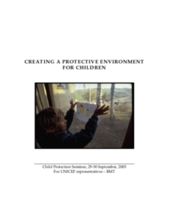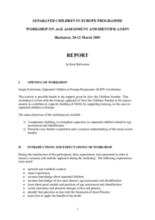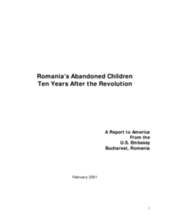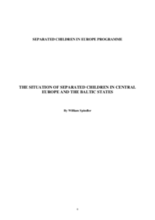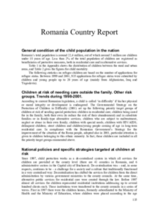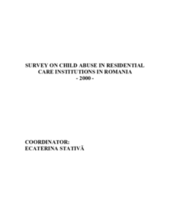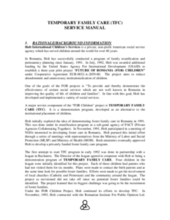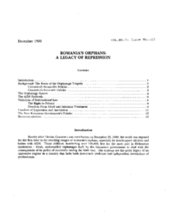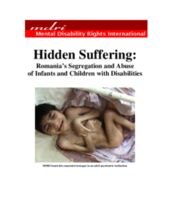Displaying 211 - 220 of 220
This report is the result of a seminar held in Kazakhstan 2004. It focuses on social welfare sector reform, and includes topics such as expanding legislative agendas and financing frameworks, as well as gate keeping. Case studies of reform processes from Romania, Tajikistan and Serbia are discussed. Includes conference agenda.
Summary of a workshop to address age assessment, identification and reception of separated children to promote guardianship, family tracing and reunification. Focuses on Romania, Bulgaria and Hungary.
An account of the massive child welfare crisis in Romania which erupted from a movement in Romania during its communist regime to institutionalize thousands of children. This paper also reports the efforts of NGO’s, PVO’s and the international communities to reverse the damage after the fall of communism and also where the efforts need to be directed.
This report reviews childcare policy for separated children in the Central Europe and the Balkan States. It emphasizes the need to establish training, resources and effective procedures in order to meet the standards outlined in the Statement of Good Practice. Data from Bulgaria, Croatia, the Czech Republic, Estonia, Hungary, Latvia, Lithuania, Poland, Romania, Slovakia and Slovenia is presented.
The purpose of this report is to document the levels of child abandonment and de-institutionalization as an indicator of the quality of social transformation during the transition decade (1990-2000).
Country report of Romania on the situation of children in residential care in anticipation of the Second International Conference on Children and Residential Care: New Strategies for a New Millennium, to be held in Stockholm 12 – 15 May 2003.
Report assessing the overall features of children in residential care institutions with consideration for families of origin, gender, socioeconomic status and type of institution.
A manual for the establishment of foster care in Romania as an alternative to the institutional placement of children. Addresses the legal framework, policies, processes, responsibilities and administration surrounding creating and maintaining a foster care system.
Shortly after Nicolar Ceauscu was overthrown on December 22, 1989, the world was exposed for the first time to the shocking images of Romania's orphans, especially its children with disabilities and babies with AIDS.
This report is the product of an 18-month investigation by Mental Disability Rights International (MDRI) into the human rights abuses of children with disabilities in Romania. This report documents a broad range of atrocious conditions for children with disabilities inside Romania’s institutions. While Romania has reduced its orphanage population and created foster care placements for many children, the reforms have left behind children with disabilities. This report documents serious human rights violations against children with disabilities in an institution for babies and in adult facilities.

